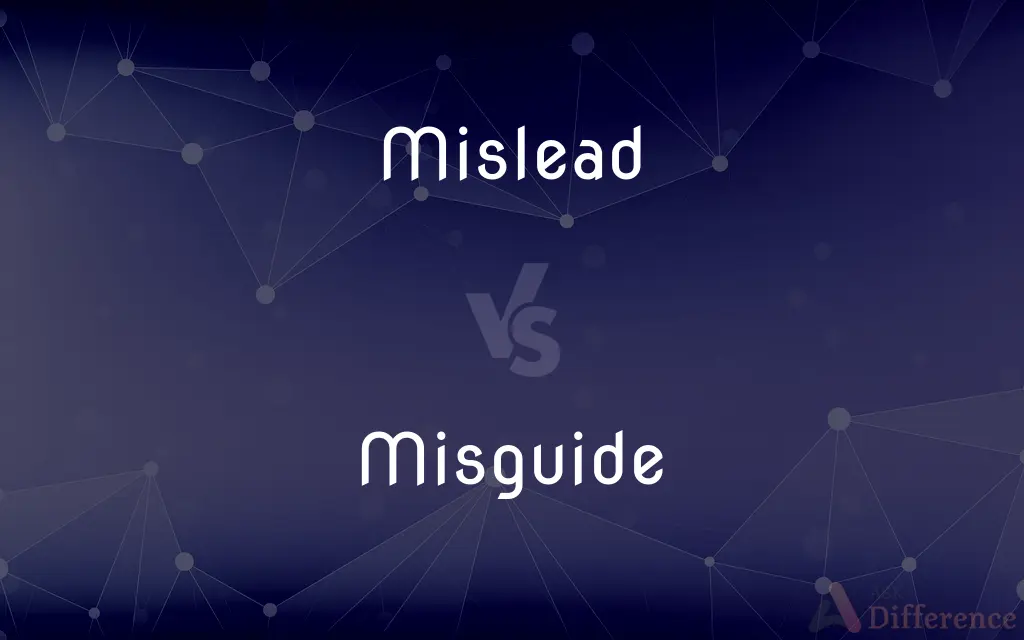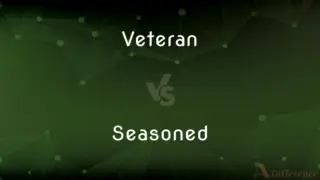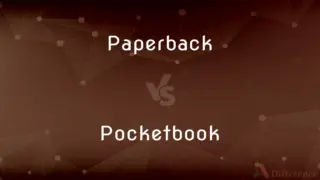Mislead vs. Misguide — What's the Difference?
Edited by Tayyaba Rehman — By Fiza Rafique — Updated on April 7, 2024
Mislead involves causing someone to believe something incorrect, while misguide implies providing wrong or unsuitable guidance.

Difference Between Mislead and Misguide
Table of Contents
ADVERTISEMENT
Key Differences
Mislead is the act of deceiving or leading someone to a false belief or conclusion, often intentionally. It focuses on causing someone to adopt a belief that is not true or to follow a course of action that diverges from the truth. Misguide, on the other hand, suggests giving incorrect or inappropriate advice or directions, not necessarily with the intention to deceive but leading to a misguided outcome.
The intent behind misleading is often to deceive or manipulate for personal gain, political advantage, or other purposes. Misguidance, however, may stem from a lack of knowledge, misunderstanding, or a failure to communicate effectively, without the deliberate intention to deceive.
Misleading can occur through statements, implications, or omissions that cause someone to hold an erroneous belief. Misguidance typically involves providing advice, instructions, or directions that lead someone astray or do not result in the intended or optimal outcome.
The consequences of being misled can be broader, affecting one’s beliefs, decisions, and perceptions of reality. Being misguided typically results in taking incorrect actions or following an unsuitable path, which may have more limited and specific repercussions.
Both misleading and misguiding actions necessitate correction and clarification when recognized. However, addressing the effects of misleading might require changing one’s beliefs or understanding, while rectifying misguidance might involve altering one’s course of action or obtaining correct information.
ADVERTISEMENT
Comparison Chart
Definition
Leading someone to believe something that is not true.
Providing incorrect or inappropriate guidance.
Intent
Often deliberate deception.
May not involve intention to deceive.
Method
Through statements, implications, omissions.
Through advice, instructions, directions.
Consequences
Affects beliefs, decisions, perceptions.
Results in incorrect actions, paths.
Correction
Requires changing beliefs or understanding.
Involves altering course of action, obtaining correct info.
Compare with Definitions
Mislead
Deception for Gain.
Advertisements sometimes mislead consumers about product benefits.
Misguide
Lack of Knowledge.
Misguidance often stems from misunderstandings or lack of information.
Mislead
Implications and Omissions.
Omitting key facts can mislead someone into making poor decisions.
Misguide
Unintentional Guidance.
Inexperienced guides might misguide tourists, leading them off the intended path.
Mislead
Political Manipulation.
Politicians may mislead the public during campaigns.
Misguide
Incorrect Advice.
Misguided advice can lead to financial losses.
Mislead
Erroneous Beliefs.
Misleading information can cause erroneous scientific beliefs.
Misguide
Following Unsuitable Paths.
Being misguided in career choices can affect one’s professional development.
Mislead
Correcting Misinformation.
Fact-checking is essential to correct misleading claims.
Misguide
Seeking Correct Directions.
Correcting misguidance usually involves consulting more reliable sources.
Mislead
Cause (someone) to have a wrong idea or impression
The government misled the public about the road's environmental impact
Misguide
To cause to be misguided; mislead.
Mislead
To lead in the wrong direction.
Misguide
(transitive) To guide poorly or incorrectly; to lead astray or into error.
Mislead
To give a wrong impression or lead toward a wrong conclusion, especially by intentionally deceiving.
Misguide
To guide wrongly; to lead astray; as, to misguide the understanding.
Mislead
(literally) To lead astray, in a false direction.
Misguide
Misguidance; error.
Mislead
To deceive by telling lies or otherwise giving a false impression.
Misguide
Lead someone in the wrong direction or give someone wrong directions;
The pedestrian misdirected the out-of-town driver
Mislead
To deceptively trick into something wrong.
The preacher elaborated Satan's ways to mislead us into sin
Misguide
Give bad advice to
Mislead
To accidentally or intentionally confuse.
Mislead
A wrong or bad lead; a leading in the wrong direction.
Mislead
(countable) That which is deceptive or untruthful (e.g. a falsehood, deception, untruth, or ruse).
Mislead
To lead into a wrong way or path; to lead astray; to guide into error; to cause to mistake; to deceive.
Trust not servants who mislead or misinform you.
To give due lightTo the mislead and lonely traveler.
Mislead
Lead someone in the wrong direction or give someone wrong directions;
The pedestrian misdirected the out-of-town driver
Mislead
Give false or misleading information to
Common Curiosities
What's the difference in correcting misleading vs. misguiding information?
Correcting misleading information often involves changing beliefs, while correcting misguidance involves altering actions.
What does it mean to mislead someone?
To cause them to believe something false, often through deception.
Can misleading be unintentional?
While misleading is often intentional, it can also occur through carelessness or lack of clarity.
How can misguidance occur without bad intentions?
Through lack of knowledge or misunderstanding, leading to incorrect advice.
Is all misguidance harmful?
Misguidance can lead to undesirable outcomes, but the harm depends on the context and the actions taken as a result.
Are there legal repercussions for misleading others?
Yes, especially in consumer protection law, misleading advertisements and statements can lead to legal penalties.
What role do educators play in preventing misguidance?
Educators can provide accurate information and teach critical thinking skills to prevent misguidance.
How does intention play a role in misleading and misguiding?
Intention is crucial in misleading (often present) and less so in misguiding, which can be accidental.
Is it easier to correct a misunderstanding or a deliberate falsehood?
Correcting misunderstandings (misguidance) is often easier than addressing deliberate falsehoods (misleading), which may involve overcoming trust issues.
How can one avoid being misled or misguided?
Critical thinking, seeking multiple sources of information, and questioning assumptions can help.
What's the impact of misleading on public perception?
Misleading information can significantly distort public perception, affecting decisions and behaviors on a large scale.
How can one rectify having misled or misguided someone?
By openly correcting the misinformation and providing accurate, reliable information.
Can someone be both misled and misguided?
Yes, someone can be misled into believing false information and misguided into taking incorrect actions based on that belief.
Why is it important to distinguish between being misled and misguided?
Understanding the difference helps in identifying the source of the error and the best way to correct it.
Can technological tools help identify misleading or misguided information?
Yes, tools like fact-checking websites and AI algorithms can help identify and correct such information.
Share Your Discovery

Previous Comparison
Veteran vs. Seasoned
Next Comparison
Paperback vs. PocketbookAuthor Spotlight
Written by
Fiza RafiqueFiza Rafique is a skilled content writer at AskDifference.com, where she meticulously refines and enhances written pieces. Drawing from her vast editorial expertise, Fiza ensures clarity, accuracy, and precision in every article. Passionate about language, she continually seeks to elevate the quality of content for readers worldwide.
Edited by
Tayyaba RehmanTayyaba Rehman is a distinguished writer, currently serving as a primary contributor to askdifference.com. As a researcher in semantics and etymology, Tayyaba's passion for the complexity of languages and their distinctions has found a perfect home on the platform. Tayyaba delves into the intricacies of language, distinguishing between commonly confused words and phrases, thereby providing clarity for readers worldwide.














































